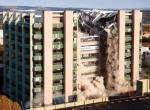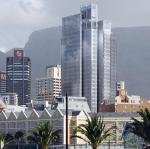Offshore work builds up Group Five
Group Five has its eastern European investments and concessions business to thank for improved earnings in the six months to end-December last year, as SA's construction market continues to languish.
But the JSE-listed infrastructure group emphasised that the gains in the first half of this financial year were relative to a low earnings base in the previous comparable period, amid “difficult South African markets”.
“General construction markets (in SA) are extremely challenging,” CEO Eric Vemer said yesterday. The country’s mining industry was hurting, but there was a “silver lining” in domestic renewable energy projects, and also in power projects elsewhere in Africa, he said.
“Our improved performance was driven by strong results from the investments and concessions cluster, which more than offset a continued weak performance from the engineering and construction cluster, which delivered operating results below expectation,” Mr Vemer said.
Group Five said the manufacturing cluster, which makes building products, had delivered a flat result relative to the six months to end-June last year. Production had been hurt by the poor general construction environment, Mr Vemer said.
The group had retrenched civil engineering contract workers as contracts ended, and reduced headcount elsewhere, including at Everite, its building products subsidiary. Civil engineering alone had 4,000 people at the start of last year and started this year with 1,500 employees. There were also some retrenchments at head office.
“It’s a decent set of results — in terms of the environment,” Roelof Brand, an analyst at Avior Capital Markets, said yesterday.
“It’s rough out there,” he said, especially for the group’s languishing civil engineering and manufacturing businesses.
But the group had less exposure to mining and oil and gas projects than some of its peers, and no exposure at all to these sectors in Australia, he said.
Group Five’s investment and concessions cluster has tolling operations mainly in Poland and Hungary. Mr Brand said rand weakness had helped the results from these markets, and the cluster was expanding rapidly.
In this regard, Mr Vemer said Group Five had “secured some significant new long-term contracts” — one in Northern Ireland and another in Hungary, for 20 years and 10 years apiece.
The group’s overall contract loss-making ratio had “significantly improved” and was in line with international norms at 19% in the same period, from 35% in the period last year.
Mr Vemer said the group had identified several courses of action to address the underperforming engineering and construction cluster. This included a stronger focus on quality execution of contracts; delivering work on time; further reducing operating costs and overheads; optimising capital employed, and improving the targeting of tenders to secure preferred work at competitive margins.
Group Five was “wholly focused” on Africa and the European business, to make up for weak South African markets, he said. That meant 41% of the order book was now situated in the rest of Africa, with this trend soon moving to 50%, and even 60% in future, Mr Vemer said.
“We have a clear strategy that will deliver sustainable profit and positive economic returns over the longer term, despite challenging market conditions in the shorter term,” he said.
“Corporate restructuring over the last year is delivering results through a more costefficient, aligned organisation, focused on profitably and safely delivering an on-time quality product to our clients. Our improved contract loss-making ratio is testament to this.”
Group Five said it had a nil net gearing ratio and the cash balance hit a record high R3.6bn at the end of the first half.

















